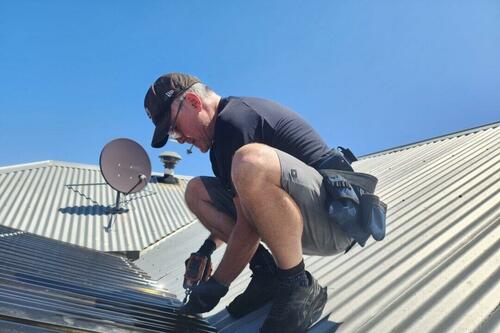
The Next Millionaire Class? Why America’s Future Depends On Tradespeople
Authored by Mollie Engelhart via The Epoch Times,
Here on the farm, the repair and maintenance list is endless. Some jobs we can handle ourselves, but many others require a tradesman—a mechanic, plumber, HVAC technician, electrician, or contractor.

When I moved to Texas, I was shocked by the cost of hiring them.
Gasoline was half the price of California. Groceries were cheaper.
But when I needed to install an air conditioner at my home in Texas, the bill was higher than when I installed a massive rooftop unit in Echo Park, Los Angeles—an installation that required a crane and even shutting down part of Sunset Boulevard.
How could that be?
The answer became clear as I watched the flow of life around me.
In our restaurant, the customers who seem most financially comfortable—the ones who spend freely on extra desserts or tip generously—are tradespeople. We have a young family who comes in regularly; the husband is an electrician, booked so solid he’s desperate to hire help. Another family comes every Saturday. The husband is a contractor and heavy equipment operator. He works even on Christmas Day, yet they shop and eat generously, week after week. And when I see them spending that way, I see the money flowing right back into our community—into small restaurants, local stores, and family businesses like mine.
Is the next millionaire class going to be plumbers, HVAC techs, septic contractors, and electricians?
I think so.
AI can write code, draft articles, even mimic human speech. But AI cannot install a septic tank. It cannot diagnose why your air conditioner won’t start in the middle of August. It cannot trace a faulty wire through a wall.
And no matter how much technology advances, human beings will always need electricity, plumbing, hot water, and functioning septic systems.
That reality doesn’t change.
The statistics are sobering.
Over half of America’s skilled trade workforce is already over 50 years old, and a massive share are set to retire in the next decade.
For every new tradesperson entering the workforce, there are twenty job openings.
By 2030, nearly 80 million tradespeople will retire, while only about 40 million new workers will enter. Already, HVAC companies report more than 100,000 jobs unfilled, with projections of 225,000 unfilled within five years. Plumbers? A shortage of half a million by 2027. Electricians? The demand is growing at three times the average rate of other jobs.
This crisis mirrors another one I know well: farming. Just as we are losing skilled tradespeople, we are also losing farmers. The average age of the American farmer is nearly 60. Small farms are disappearing every year. And yet food, like electricity, is not optional. Without farmers and tradespeople, the foundation of life collapses.
What is our plan for the future if nobody is growing our food, installing our electricity, fixing our air conditioners, maintaining our plumbing, and running our septic systems?
We must shift back to remembering what is truly important. To someone in an apartment in the city, it might seem that ordering from Amazon, Uber Eats, or Instacart makes life run. But none of that works without the farmer who grows the food and the tradesperson who keeps the electricity flowing, the plumbing running, the air conditioners humming.
The irony is that as our culture pushes young people toward screens and degrees, the greatest opportunities may actually be in the fields and on the job sites.
AI can replace some office jobs, but it cannot replace the physical work of keeping life running.
The wealth of tomorrow may belong not to those writing code in air-conditioned towers, but to those willing to sweat under the sun or climb under a house.
America’s future may well depend on the very people we have undervalued for too long.
The question is whether we will wake up in time to honor and support them—or whether we will only realize their importance when the lights go out, the toilets back up, and the shelves run bare.
Tyler Durden
Wed, 08/27/2025 – 17:00










![Powrót tradycji w Rzeszowie. Oficjalne ślubowanie Straży Miejskiej [ZDJĘCIA]](https://storage.googleapis.com/bieszczady/rzeszow24/articles/image/57ce861d-7991-4c1e-b85e-ab83a2abaff4)






